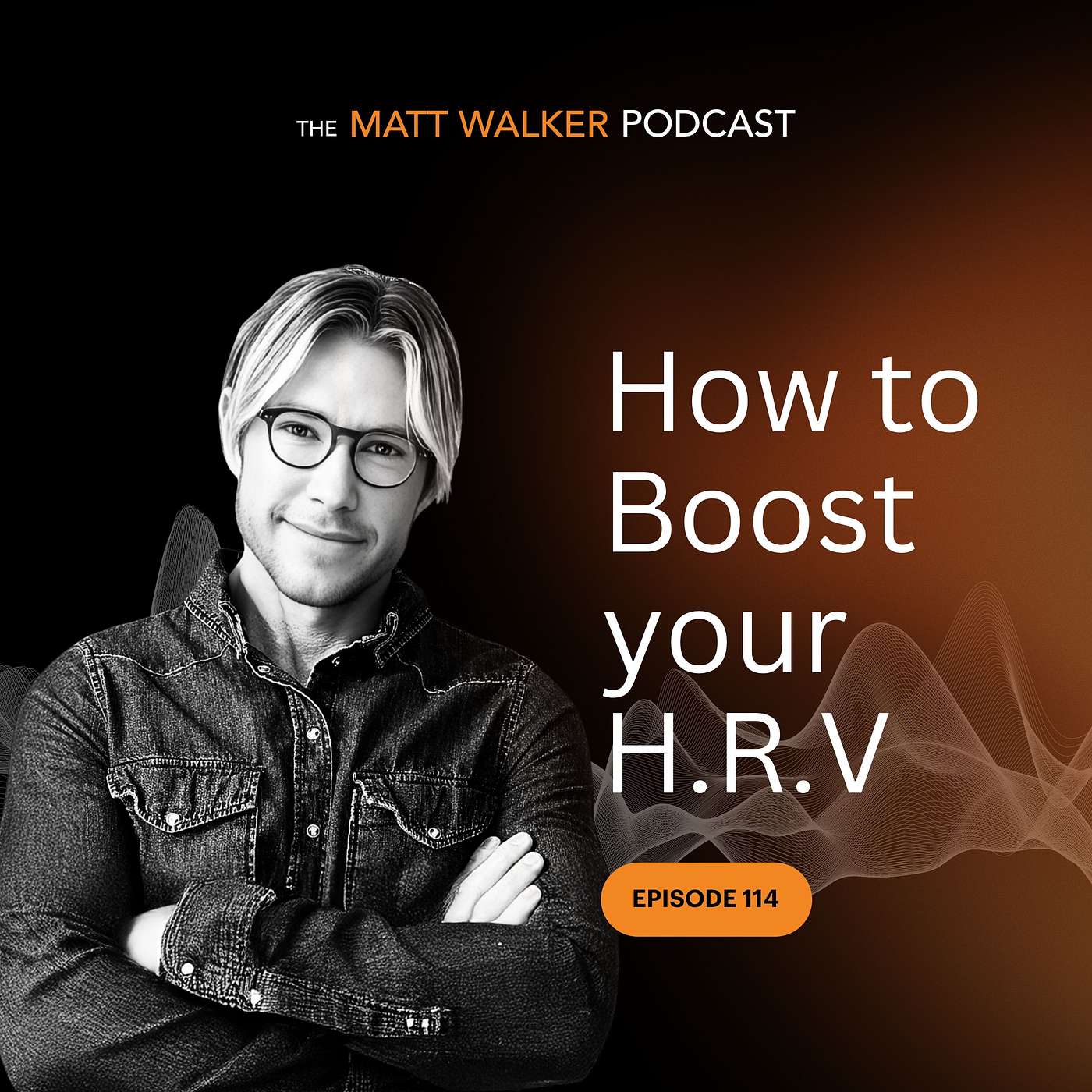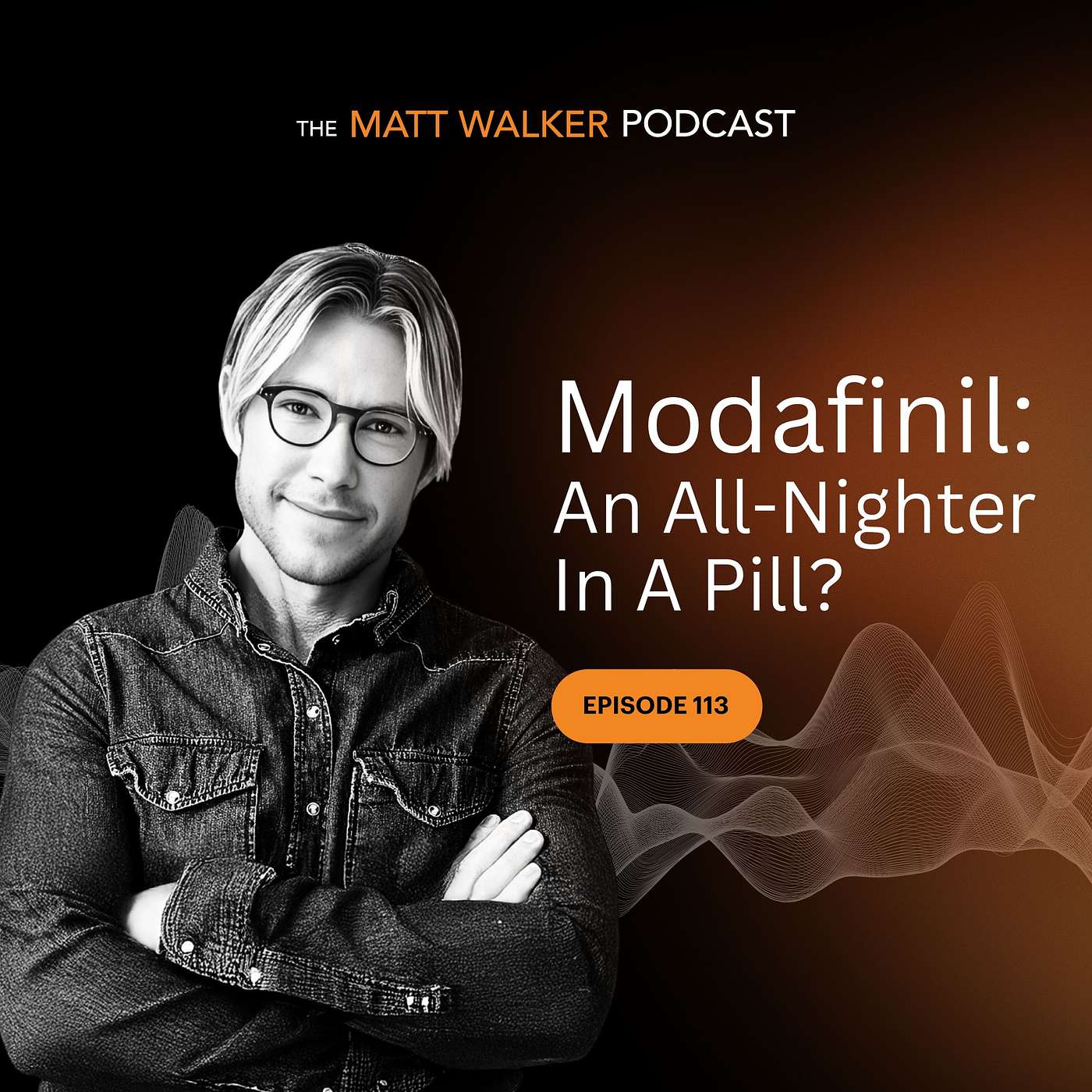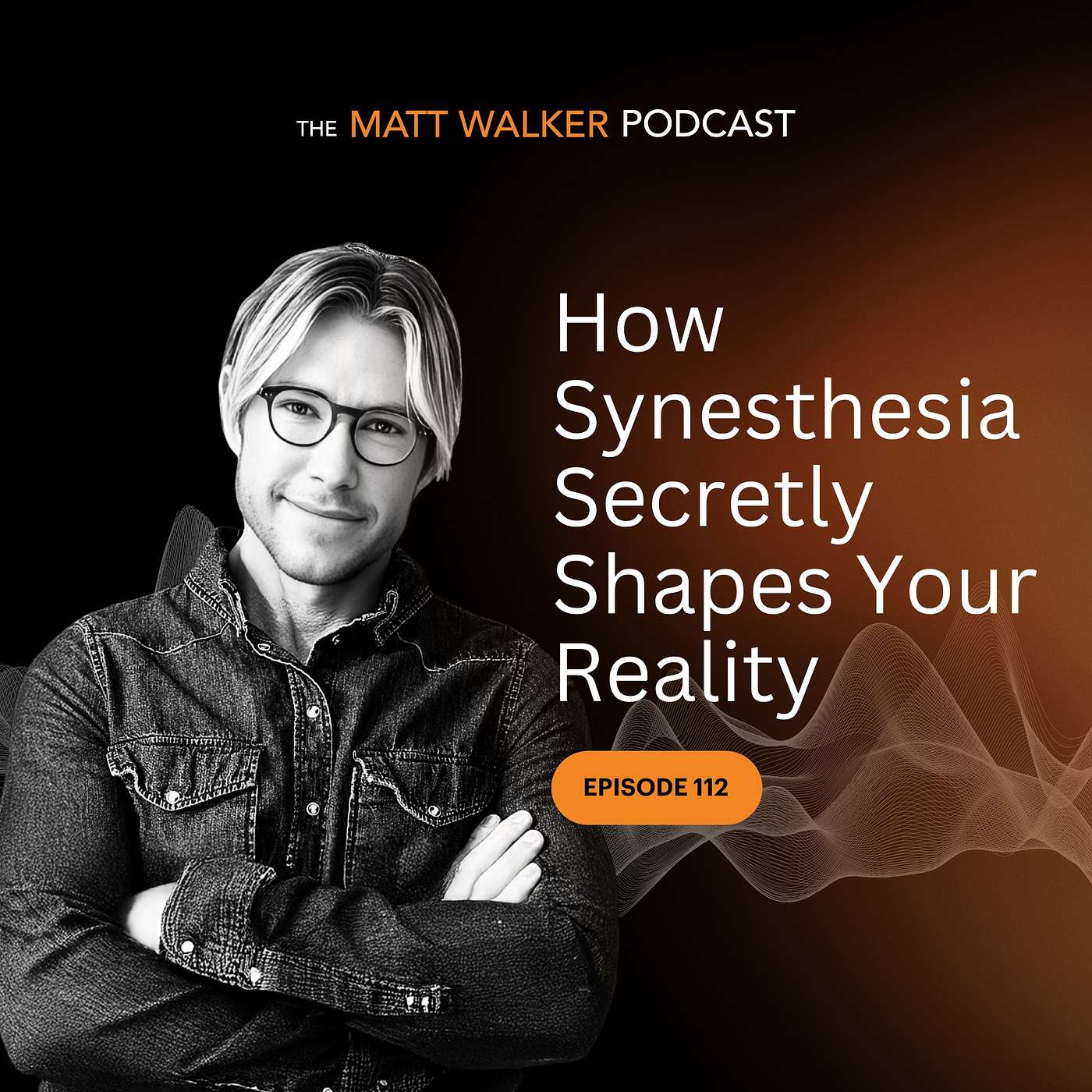Discover The Matt Walker Podcast
The Matt Walker Podcast

The Matt Walker Podcast
Author: Dr. Matt Walker
Subscribed: 2,784Played: 90,460Subscribe
Share
© 2025 The Matt Walker Podcast
Description
The Matt Walker Podcast is all about sleep, the brain, and the body. Matt is a Professor of Neuroscience at the University of California, Berkeley. He is the author of the book, Why We Sleep and has given a few TED talks. Matt is an awkward British nerd who adores science and the communication of science to the public.
152 Episodes
Reverse
Join Matt to leave the day’s rush behind. After a brief breathing exercise to settle the mind and body, you will find yourself on a quiet street in a British village. Matt leads you across a small stone bridge to a cozy bookshop nestled between two old brick buildings. This sanctuary is filled with the faint scent of aged paper and polished wood, providing a peaceful haven where time slows down and the stresses of the day are left behind. Once you are inside the shop, you can wander through t...
Exploring GLP-1 agonists in a new light, Matt examines a review that positions these metabolic hormones as potential brain defenders. He details their surprising presence in memory centers and their capacity to combat the "biological rust" of oxidative stress and neuroinflammation. Matt critically evaluates the gap between robust animal models and the unwritten chapter of human trials, while highlighting the vital link between metabolic health and sleep. He argues that biology is not siloed; ...
Matt examines the critical link between sleep quality and Alzheimer’s pathology. He details the brain's "night shift" - the glymphatic system - which actively flushes out toxins like amyloid beta during deep sleep. Listeners learn how even a single night of deprivation can spike harmful tau levels by 50%, effectively accelerating brain aging. The discussion pivots to dual orexin receptor antagonists (DORAs), a drug class that quiets wakefulness rather than forcing sedation. Matt highlights re...
In this latest AMA episode, Matt and Dr. Eti Ben Simon explore the complex web connecting sleep to our health and daily lives. They investigate the gut-brain axis, discussing how sleep deprivation alters the microbiome and whether probiotics can restore balance. The conversation also addresses the heavy toll of bereavement, examining the bidirectional link between acute grief and insomnia while offering evidence-based strategies to manage sleep during times of loss. The discussion shifts to c...
Matt confronts the systemic failure of sleep deprivation, examining its impact on our biological machinery. When sleep is short, the body's "fuel gauge" dips, impairing mitochondrial function and glucose tolerance. However, he highlights compelling research on two interventions - creatine supplementation and high-intensity interval training. These act as backup generators, offering a physiological buffer to preserve metabolic and executive functions when rest is unavoidably restricted. The ep...
Matt ventures into the realm of 40 Hz "gamma" rhythms - the conductor of the biological orchestra during high-order cognition - to explore how non-invasive light and sound stimulation can entrain brain activity, nudging neurons into synchrony. Crucially, Matt examines ground-breaking Alzheimer’s research where this rhythm rallies the brain's immune cells to clear toxic plaques, potentially stabilizing memory and preventing atrophy in early-stage patients. Beyond cognition, Matt uncovers a neu...
The counterintuitive use of sleep deprivation as a rapid treatment for major depression finds itself squarely in Matt’s spotlight today. He begins by discussing its origins in the 1970s, where one night of wakefulness induced temporary remission in 40-60% of patients, and goes on to note that this effect is fragile, with an 83% relapse rate after recovery sleep, pointing to a paradox where sleep itself may be depressogenic for some. Matt reviews the neuroscientific explanations, including the...
Matt delves into Heart Rate Variability (HRV), the subtle variation in timing between each heartbeat. He explains that a healthy heart is like a "jazz drummer," not a rigid metronome, and a higher HRV reflects a resilient body that can adeptly balance its stress and rest systems. This episode unpacks the science behind HRV and explores the actionable strategies you can employ to improve this critical marker of your overall health. Matt then explores the key lifestyle factors that significantl...
Diving into the controversial world of Modafinil, the "all-nighter in a pill", Matt begins with the story of Olympic sprinters using the narcolepsy drug as a loophole for a competitive edge. He then unpacks the science of how Modafinil affects brain chemistry to boost wakefulness and cognition, tracing its evolution from a medical treatment to a performance enhancer for the military, Wall Street, and students, all attempting to push human limits by cheating sleep. Despite its potent effects, ...
Matt explores the fascinating world of synesthesia today, challenging the notion that it's a rare quirk by proposing a bold claim: in subtle ways, we are all synesthetes. This idea is powerfully demonstrated by the famous "Bouba/Kiki" test, which reveals our brain's innate tendency to connect abstract shapes and sounds. The episode argues that this fundamental cross-wiring is not a mere curiosity but the very operating system for human thought, shaping everything from our metaphors to the dev...
Framing sleep not as a biological necessity, but as a critical economic asset, Matt reveals that sleep deprivation costs the U.S. economy up to $411 billion annually, with billions more lost globally. These costs stem from lost workplace productivity, severe cognitive impairment equivalent to intoxication, and massive strains on healthcare and public safety systems due to chronic disease and accidents like drowsy driving. Matt provides the solution: investing in sleep as a powerful economic s...
In this user's guide to sleep trackers, learn the science behind how they work using motion and optical sensors as Matt explains the key metrics of Sensitivity, Specificity, and Accuracy. Revealing why most trackers overestimate sleep by failing to detect wakefulness, he reveals the crucial difference between a device's flawed "absolute accuracy" and its more valuable "relative accuracy," which highlights the importance of tracking long-term trends over single-night scores. Matt goes on to ex...
Matt takes a deep dive into REM sleep this week, highlighting methods to enhance this vital stage for emotional regulation and creativity. Detailing pharmacological approaches, he focuses on the neurotransmitter acetylcholine and how medications like donepezil and modern DORAs can boost REM sleep, while also identifying common suppressors like alcohol and THC. Throughout the episode, he also emphasizes that the goal is not to maximize one stage but to achieve a balanced sleep architecture. Th...
In this soothing episode, Matt guides you on your personal sleep story towards deep, restorative rest. He invites you to find comfort and release the day's worries through intentional breathing, transporting you to a cozy, imagined haven bathed in soft lights and calming aromas. As twilight descends, experience the tranquil silence and the moon's gentle glow, replacing any turmoil with profound inner peace. A powerful visualization encourages you to shed thoughts and concerns, picturing them ...
In this week’s episode, Matt Walker explores memory's astonishing malleability, challenging the belief that recollections are fixed. He highlights Loftus's car crash study, showing how subtle language altered speed memories and implanted false details, and reviews the "Lost in the Mall" experiment which proved fabricated autobiographical memories can be instilled. Matt also notes that neuroimaging reveals false and true memory patterns in the hippocampus are remarkably similar, underscoring m...
Founder & CEO of Elevated Medical, Dr. Avinish Reddy, joins Matt today on this very special episode to discuss a comprehensive approach to longevity. One core theme presented is the profound interconnectedness of physical, mental, and cognitive well-being, essential for true health optimization. Dr. Reddy emphasizes the striking impact of social connection: isolation can increase early death risk by 50%, comparable to smoking. He believes fostering strong social bonds is a fundamental pil...
In this latest AMA instalment, Matt and Dr. Eti Ben Simon begin by discussing environmental influences on sleep. The conversation covers how high latitude and prolonged daylight disrupt circadian rhythms, with Eti sharing her own personal experience. Together, our duo shares strategies for managing light exposure and regulating core body temperature with methods like warm baths. The episode also offers evidence-based approaches for shift workers, including strategic napping and forward-rotati...
Matt explores the critical link between sleep and Alzheimer's disease today, explaining how the brain’s "glymphatic system" clears toxic proteins like amyloid and tau during deep sleep. He describes how insufficient sleep impairs this process, creating a vicious cycle where protein accumulation damages sleep-generating brain regions and increases dementia risk. Matt goes on to discuss groundbreaking research on a new class of sleeping pills, Dual Orexin Receptor Antagonists (DORAs), that may ...
Matt and Dr. Eti Ben Simon join forces once again to answer all of your top sleep questions. This time around, they break down the science behind the snooze button, why you might be falling asleep during passive activities like watching TV, and the truth about sleep fads like consuming salt before bed or using "grounding sheets." The episode also explores the frustrating issue of sleep fragmentation - waking up multiple times a night - and why it undermines sleep quality even if you fall back...
In this episode, Matt delves into the curious and cautionary tale of Delta Sleep-Inducing Peptide (DSIP), once hailed as a potential miracle cure for insomnia. In the 1970s, researchers were on a quest for a single "somnogenic molecule" that could act as the brain's natural sleep switch. A Swiss team believed they had found it, isolating a peptide that appeared to rapidly induce deep, slow-wave sleep when injected into animals. This initial excitement led to bold claims and sparked decades of...

























Loved this one! This is what I've been doing through EMDR and on my own intuitively. Rewriting memories, processing the emotions. Awesome stuff!
informative
thank you
I really had fun🥳
Hi, many thanks to you for this wonderful podcast on sleep. I'm currently doing a master thesis on it and I've learned various stuff from you since I started this journey. I have a question.How does thermal sleep environment effects sleep? I tuned up related episode but since this podcast is a popscience podcast unfortunately I couldn't to take details about it. I would love to hear about it in a more detailed podcast or any possible way to discuss about it.
much love ❤️
So great. The John Delony show sent me here.
Got excited with every episode being released
I'm so glad to reach you through this ap and I'm sure it'll be useful for me to become aware of how to live with pleasure as an adult 😀
I really enjoyed all of the episodes. thank you for tellin these fascinating informations with your calming voice😃
Loved his book and the pod casts are a great refresher. I'd love it if they were longer. The commercials are a bit too long considering the length of the podcast. I hope they're paying him mad cash for all the air time they are getting heh.
Tnxxx🙏🙏🙏
Listened to the audio version of his book, which is really good. These episodes are way too short. And commercials are like 20% of the content 👎
Hi!thank you for informations.I've been suffering from insomnia since 10 years ago and it ended up getting addict to Zolpidem and its ridiculous drug tolerance.I wish one night,just one fucking night I could sleep and have dreams.
thanks Matt. really enjoying learning more about sleep.
Thank you very much. I love the information I learn from the scientists.
I wanted to thank you for just starting this podcast. and I will be following your work. Awesome!